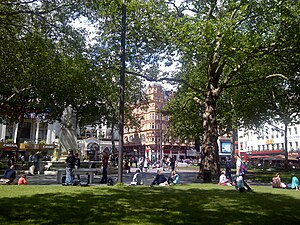Difference between revisions of "Leicester Square"
m (→1920s) |
Ross Burgess (Talk | contribs) |
||
| (3 intermediate revisions by 2 users not shown) | |||
| Line 1: | Line 1: | ||
| − | '''Leicester Square''' is a garden square in London's [[West End]]. It sits in the middle of a | + | [[File:Redeveloped Leicester Square.jpg|thumb|Leicester Square]]'''Leicester Square''' is a garden square in London's [[West End]]. It sits in the middle of a pedestrian zone and is famous for its cinemas and film premieres. It was rennovated in 2012. |
== 1920s == | == 1920s == | ||
| − | During the 1920s Leicester Square, along with [[The Strand] | + | During the 1920s Leicester Square, along with [[The Strand]], became the focus of queer commercial sociability<ref>Queer London, 2005</ref>. It was the heart of London's nightlife and men could socialise in the galleries of the [[Empire]] and [[Alhambra]], [[Jack Bloomfield's]] pub, [[Russell's Bar]] and the [[Cavour]]. |
The gay focus later moved to the neighbouring [[Piccadilly Circus]] after suffering a demise after the Met and LCC clamped down on heterosexual vice, making gay men's presence less acceptable. In 1927 the [[News of the World]] lamented the Square's "decay... its conversion... from gay Bohemianism to ultra-respectability". | The gay focus later moved to the neighbouring [[Piccadilly Circus]] after suffering a demise after the Met and LCC clamped down on heterosexual vice, making gay men's presence less acceptable. In 1927 the [[News of the World]] lamented the Square's "decay... its conversion... from gay Bohemianism to ultra-respectability". | ||
== 1990s == | == 1990s == | ||
| − | In the early 1990s an American diners-style bar called the [[Locomotion]] became almost exclusively gay and lesbian. The large nightclub on the corner of Charing Cross Road, the [[Hippodrome]], had a weekly gay night on Mondays. The [[Limelight]], a converted church, held Sunday afternoon tea dances organised by [[The Village]]. | + | In the early 1990s an American diners-style bar called the [[Locomotion]] became almost exclusively gay and lesbian. The large nightclub on the corner of Charing Cross Road, the [[Hippodrome]], had a weekly gay night on Mondays. The [[Limelight]], a converted church, held Sunday afternoon tea dances organised by [[The Village]]. The [[Café de Paris]] hosted a weekly Sunday afternoon club in the late '90s, and still plays host to many queer functions. |
See [[Timeline of West End Bars and Clubs]]. | See [[Timeline of West End Bars and Clubs]]. | ||
Latest revision as of 15:44, 24 February 2014
Leicester Square is a garden square in London's West End. It sits in the middle of a pedestrian zone and is famous for its cinemas and film premieres. It was rennovated in 2012.1920s
During the 1920s Leicester Square, along with The Strand, became the focus of queer commercial sociability[1]. It was the heart of London's nightlife and men could socialise in the galleries of the Empire and Alhambra, Jack Bloomfield's pub, Russell's Bar and the Cavour.
The gay focus later moved to the neighbouring Piccadilly Circus after suffering a demise after the Met and LCC clamped down on heterosexual vice, making gay men's presence less acceptable. In 1927 the News of the World lamented the Square's "decay... its conversion... from gay Bohemianism to ultra-respectability".
1990s
In the early 1990s an American diners-style bar called the Locomotion became almost exclusively gay and lesbian. The large nightclub on the corner of Charing Cross Road, the Hippodrome, had a weekly gay night on Mondays. The Limelight, a converted church, held Sunday afternoon tea dances organised by The Village. The Café de Paris hosted a weekly Sunday afternoon club in the late '90s, and still plays host to many queer functions.
See Timeline of West End Bars and Clubs.
References
- ↑ Queer London, 2005
